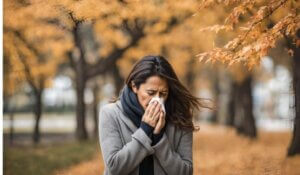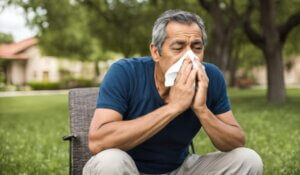
For people like me, these reactions are triggered by everyday substances like pollen, dust mites, or pet dander—things most people don’t think twice about. But for those of us with allergies, these seemingly harmless particles can send our immune systems into overdrive. When allergens enter the airways, the body releases histamine, a chemical that’s at the heart of the allergic response. It causes swelling, narrows the airways, and ramps up mucus production, leaving you sneezing, coughing, and sometimes struggling for air.
After battling through countless sleepless nights during which I tried so many different folk remedies, I found a game-changer: antihistamines. They’ve made such a difference in my life, breaking the cycle of escalating symptoms and giving me the freedom to enjoy time outdoors again without the fear of an allergic reaction taking over.
Treating allergies with antihistamines
Treating allergies that cause breathing issues involves both managing the symptoms and identifying the root cause. Medications like antihistamines and corticosteroids can reduce swelling and block histamine’s effects. In severe cases, doctors may prescribe inhalers or even recommend immunotherapy, a process that desensitizes the immune system to specific allergens over time. Avoidance strategies, like using air purifiers and keeping windows closed during allergy season, can also play a key role.
Diving deeper into allergies
Allergies have been known for centuries to occur when the immune system overreacts to substances that are harmless to most people, such as pollen, mold, dust mites, or pet hairs, but which can generate severe and even fatal reactions in people with specific sensitivities. When the substances (called allergens) enter the airways, they can trigger a chain reaction that leads to symptoms like sneezing, coughing, and, in severe cases, difficulty breathing, high blood pressure, and even worse.
For me, it was grass. Especially in spring, when the gardens and fields throughout our neighborhood were springing back into full bloom, there was hardly a place outdoors where I could avoid the effect of the triggers. It’s not just touching grass that could set me off, and the range of symptoms was wide. A runny, stuffy, or itchy nose, postnasal drip, or sneezing could be the first sign that an attack was about to begin. It could be followed by puffy eyes, trouble breathing, coughing, tightness across my chest, congestion, wheezing, or shortness of breath. If I ever actually came into contact with grass, it could break out into hives, rashes, or welts, leading to endless itching.
How histamines trigger allergies

Histamines carry messages between cells and trigger a response. In my case, a specific form of histamine is the primary cause of my allergy symptoms, like sneezing, breathing difficulties, and runny nose. Its release is triggered when the immune system overreacts to grass.
Depending on where the histamine molecules land, they can cause many different reactions. Within the circulation, it can cause small blood vessels to widen and leak, which can lead to swelling of the surrounding tissues. Histamine can also cause smooth muscles to contract, affect the quantity of gastric acids being produced in the stomach, and can even increase the heart rate.
Histamine is most concentrated in the lungs, and in mast cells, which are a type of white blood cell that are found in connective tissues, especially in the lungs, intestines, nerves, and near blood and lymph vessels.
Fighting excess histamines with antihistamines.
As the name implies, the primary purpose of antihistamine medication is to block histamine’s action. It works to block cells from reacting to histamines that have been released and can treat common allergies. Two main classes of histamines, based on their receptors (receptors H-1 and H-2), trigger specific responses. To treat breathing problems such as allergies and allergic rhinitis, antihistamines must bind to H-1 receptors. Antihistamines that bind to H-2 receptors treat upper gastrointestinal conditions caused by excessive stomach acid.
Answers I have learned to some basic questions about antihistamines
What does histamine do to the body?
Histamine acts as a messenger in the immune system, triggering inflammation. Its actions can result in short-term swelling, redness, and increased mucus production, leading to allergy symptoms like a runny nose, itchy and watery eyes, and breathing problems.
How to clear histamines from the body?
It is possible to lower levels of histamine from the body, and so reduce the reactions, although this can only be of limited effect if the body has already established a high level of sensitivity to a specific trigger. Upping the consumption of fruits like apples, mangoes, pears, peaches, blueberries, and pomegranates can help. Focus on foods with high levels of vitamin C, like citrus fruits (grapefruit, lemons, limes, and oranges) as well as fresh vegetables and foods such as tomato, squash, avocado, eggplant, and spinach. Avoid histamine-rich foods like aged cheese, alcohol, and processed meats.
What is a very strong antihistamine?
Several antihistamines, like Benadryl (diphenhydramine), have been around for many years. These are highly effective at blocking histamine but can cause significant drowsiness. I used to buy these by the truckload, but my goodness—did they knock me out! Second-generation antihistamines like Zyrtec (cetirizine) are also considered suitable for treating allergies, with more potent options and fewer side effects.
What is the difference between an antihistamine and a histamine blocker?
While both target histamine, antihistamines such as Zyrtec are H1 blockers, which means they focus on allergies and symptoms like sneezing, hay fever, and itchy eyes. In contrast, histamine blockers (H2 blockers) treat stomach issues by reducing histamine’s effects on acid production.
What should you not mix with antihistamines?
I have learned from bitter experience that I should avoid mixing antihistamines with alcohol, as this combination can increase drowsiness and impair coordination. Additionally, it’s been explained to me that certain medications like sedatives, antidepressants, and muscle relaxants may intensify antihistamines’ sedative effects, so I always consult a healthcare provider when the question of changes in medication comes up.
Do antihistamines dry up mucus?
Yes, antihistamines can reduce mucus production by blocking histamine’s effects. This can decrease the swelling and fluid buildup in the nasal passages. However, they sometimes also dry up my mouth as a side effect.
Is it bad to take antihistamines every day?
For me, having a chronic condition like seasonal allergies meant taking antihistamines daily is necessary. It’s generally considered safe when following a doctor’s advice. However, long-term use of first-generation antihistamines may cause side effects like memory issues, so newer options are the ones I prefer.
Do antihistamines calm you down?
Antihistamines were developed in the 1940s. First-generation antihistamines like Benedryl can have a calming effect because they enter the brain and act as sedatives. However, second-generation antihistamines, such as Allegra (fexofenadine), are designed to avoid this soothing effect.
Who shouldn’t take antihistamines?
People with conditions such as glaucoma, enlarged prostate, or severe liver disease should avoid some antihistamines. Pregnant or breastfeeding women should also consult a doctor before use.
What does antihistamine do for sinuses?
Antihistamines help reduce sinus congestion by blocking histamine, which decreases inflammation and mucus production in the nasal passages, allowing easier breathing.
Do antihistamines cause weight gain?
Some antihistamines, particularly older ones like Benadryl, have been linked to weight gain due to increased appetite or changes in metabolism. The modern options typically have fewer effects on weight, so I have escaped this outcome.
Do antihistamines help immediately?
An OTC type of antihistamine like Benadryl can provide quick relief, often within 30 minutes, but I, personally, have generally avoided it because of the side effects of antihistamines. My doctor has recommended a range of prescription antihistamines, including nasal sprays such as Claritin, Clarinase, and Ryaltris (all based on loratadine), because although they may take longer to yield full relief, their benefits last throughout the day and they don’t affect me the same way as Benadryl. Please keep in mind that this is only my personal experience with specific antihistamines – speak with your doctor and do what’s right for you!
Is it bad to take an antihistamine every night?
I have found that the occasional use of antihistamines for sleep has generally been safe, but it’s become clear that long-term nightly use, especially of the sedating types, can induce some of the common side effects like grogginess or memory issues. They also can lead to more serious outcomes like dependency, so this is something that should only be undertaken under close guidance by a doctor.
How can I lower my histamine levels quickly?
To quickly lower histamine levels, I used to try taking an over-the-counter antihistamine and avoiding histamine-rich foods like alcohol, fermented items, and smoked meats. Drinking water and taking vitamin C supplements also helped.
Do antihistamines reduce inflammation?
Antihistamines reduce inflammation indirectly by preventing histamine from triggering the inflammatory process, which helps alleviate swelling and redness.
















